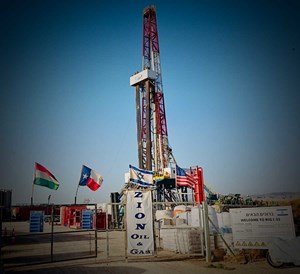Oil jumps as Iran calls for Israel embargo following deadly Gaza hospital explosion
(Bloomberg) – Oil leaped higher after Iran called for an embargo against Israel by Muslim countries, following a deadly explosion at a Gaza hospital that raised the risk of wider hostilities in the Middle East.
Brent futures rose 3% to trade near $93 a bbl. Iran’s foreign minister called for a full and immediate boycott of Israel by Muslim countries, including an oil embargo on the country.
While Israel’s oil imports are small in the context of global supply and little comes from the Middle East, the comments were significant in that they marked verbal escalation over the war between Israel and Hamas, which is considered a terrorist organization by the U.S. and European Union.
It follows a blast at a hospital in Gaza City that killed hundreds. Leaders of Jordan, Egypt and the Palestinian Authority canceled a summit with U.S. President Joe Biden, complicating his push to ensure the Israel-Hamas conflict doesn’t widen across the region. Biden arrived in Israel early Wednesday.
“Traders are watching closely for any sign the conflict is spilling over in ways that could have a big supply impact,” said Richard Bronze, an analyst at consultant Energy Aspects, adding that Israel mostly gets its oil from outside the Middle East and North Africa region. “But calls for an embargo will add to the comparisons to the 1970s crises that were already being discussed in the market, even if the impact is mostly symbolic for now.”
The global oil market has been rocked by the Middle East crisis. Tehran, which supports Hamas, had already been warning of the scope for escalation. Traders had been on alert in case Israel opts to launch a ground offensive into Gaza, potentially igniting a broader conflict that may draw in Iran, a key crude supplier, and other states.
“Clearly a widening of the conflict would bring more supply risks to a market which is already very tight,” said Warren Patterson, head of commodities strategy for ING Groep NV in Singapore. “The most immediate supply risk likely remains around Iranian barrels.”
Gaza authorities said the hospital blast that left hundreds dead was caused by an Israeli airstrike. Israel, meanwhile, pointed the finger at a failed missile from militant group Palestinian Islamic Jihad. The Pentagon said it didn’t have information on who was responsible.
Most of Israel’s crude comes from producing countries in West Africa or the Mediterranean, according to data compiled by Bloomberg. That would diminish the scope of any boycott, even if it continues to fan tensions in the region.
“The situation was already so dangerous that it merited an unplanned visit by POTUS,” said Paul Horsnell, head of commodities research at Standard Chartered. “Once a level of risk commensurate with that is reached, it’s perhaps hard to graduate the scale further.”
Beyond the region, crude got additional support Wednesday from data showing better-than-expected economic growth in China. The largest oil importer, also churned through a record 15.54 MMbpd of crude in September on the back of strong demand.



